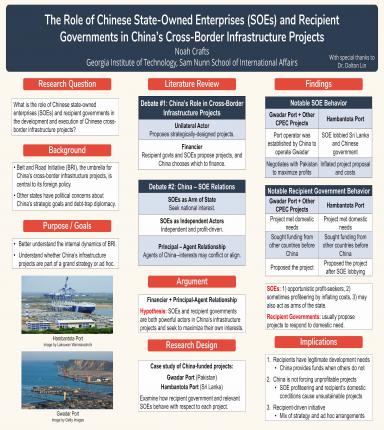Name
Noah Crafts
Class
INTA 4500
About This Project
Noah Crafts’ research is on the internal dynamics of China-funded cross-border infrastructure projects as he was interested in how actors outside the Chinese government shape their development and execution. He seeks to answer the question of: What is the role of Chinese state-owned enterprises (SOEs) and recipient governments in the development and execution of Chinese cross-border infrastructure projects?
In order to answer this question, Crafts did a case comparison between the Hambantota Port in Sri Lanka and the Gwadar Port in Pakistan, both of which were funded primarily by the Chinese government and constructed by a Chinese SOE.
Crafts found that SOEs can act as an arm of the Chinese government in executing its foreign policy as well as behave as independent actors who seek their own economic self-interest. In the latter case, SOEs leverage their status as state-owned firms and their connections within foreign countries to lobby both China and recipient governments. Furthermore, he found that recipient governments play a leading role in proposing and shaping projects to meet or respond to their domestic political, security, or economic needs.
His research demonstrates that the likelihood of a consistent strategy between all China-funded projects is low and thus challenges the commonly held belief that China’s cross-border infrastructure projects are guided by grand strategy. Perverse outcomes such as failed or unsustainable projects are likely best explained by SOE profiteering or the domestic conditions of recipients rather than any form of “debt-trap diplomacy” by the Chinese government.



